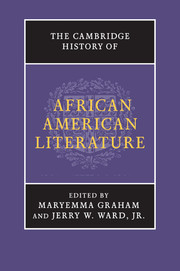Book contents
- Frontmatter
- Introduction
- PART I AFRICAN AMERICAN LITERATURE FROM ITS ORIGINS TO THE TWENTIETH CENTURY
- PART II AFRICAN AMERICAN LITERATURE IN THE TWENTIETH CENTURY
- 12 Foundations of African American modernism, 1910–1950
- 13 The New Negro Movement and the politics of art
- 14 African American literature and the Great Depression
- 15 Weaving jagged words: the black Left, 1930s–1940s
- 16 Writing the American story, 1945–1952
- 17 Geographies of the modern: writing beyond borders and boundaries
- 18 African American literature by writers of Caribbean descent
- 19 Reform and revolution, 1965–1976: the Black Aesthetic at work
- 20 History as fact and fiction
- 21 Redefining the art of poetry
- 22 Cultural resistance and avant-garde aesthetics: African American poetry from 1970 to the present
- 23 New frontiers, cross-currents and convergences: emerging cultural paradigms
- PART III AFRICAN AMERICAN LITERATURE AS ACADEMIC AND CULTURAL CAPITAL
- Bibliography
- Index
- References
16 - Writing the American story, 1945–1952
from PART II - AFRICAN AMERICAN LITERATURE IN THE TWENTIETH CENTURY
Published online by Cambridge University Press: 28 May 2011
- Frontmatter
- Introduction
- PART I AFRICAN AMERICAN LITERATURE FROM ITS ORIGINS TO THE TWENTIETH CENTURY
- PART II AFRICAN AMERICAN LITERATURE IN THE TWENTIETH CENTURY
- 12 Foundations of African American modernism, 1910–1950
- 13 The New Negro Movement and the politics of art
- 14 African American literature and the Great Depression
- 15 Weaving jagged words: the black Left, 1930s–1940s
- 16 Writing the American story, 1945–1952
- 17 Geographies of the modern: writing beyond borders and boundaries
- 18 African American literature by writers of Caribbean descent
- 19 Reform and revolution, 1965–1976: the Black Aesthetic at work
- 20 History as fact and fiction
- 21 Redefining the art of poetry
- 22 Cultural resistance and avant-garde aesthetics: African American poetry from 1970 to the present
- 23 New frontiers, cross-currents and convergences: emerging cultural paradigms
- PART III AFRICAN AMERICAN LITERATURE AS ACADEMIC AND CULTURAL CAPITAL
- Bibliography
- Index
- References
Summary
Any consideration of the period 1945–52 in African American letters must take as its starting poRichard Wright, whose masterful autobiography, Black Boy (1945), is arguably the most important life story from the culture since Booker T. Washington's Up From Slavery, which in many ways it contradicted. Ushering in the postwar era, it was an angry, bitter book, despite the fact that it focuses on Wright's personal experiences from age four to his flight from the South in 1927 at nineteen. It spoke eloquently for the rage that motivated African Americans in the days after the Second World War, a conflict that they had helped win, in terms of both the heroism of black servicemen and the stateside employment of black workers in war factories. Veterans who had been welcomed abroad as liberating heroes were unwilling to return to submissive places in American society, which meant back seats on buses, restrictive covenants that kept blacks out of white neighborhoods, segregated and inferior schools, and voting restrictions in Southern states. While many African Americans therefore continued the “Great Migration” to Northern cities after the war, those remaining or returning to the South increasingly began to join resistance organizations, which ultimately led to the powerful influence of the Brotherhood of Sleeping Car Porters and the Congress of Racial Equality (founded 1942), the redefinition of the long-existing National Association for the Advancement of Colored People, and, perhaps most importantly, the creation in 1957 of the Southern Christian Leadership Council.
- Type
- Chapter
- Information
- The Cambridge History of African American Literature , pp. 341 - 355Publisher: Cambridge University PressPrint publication year: 2011



